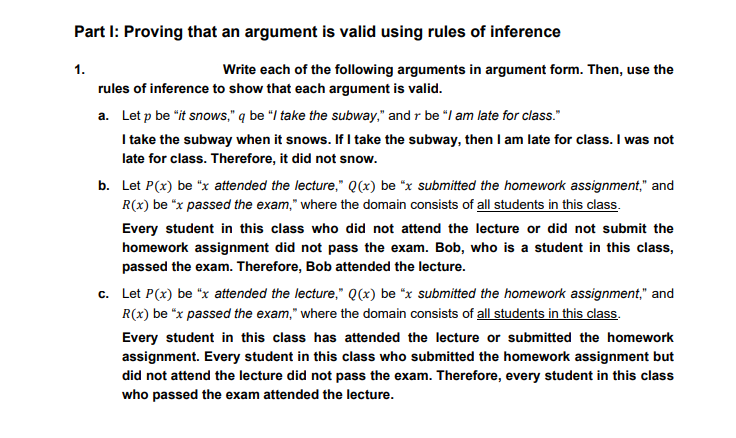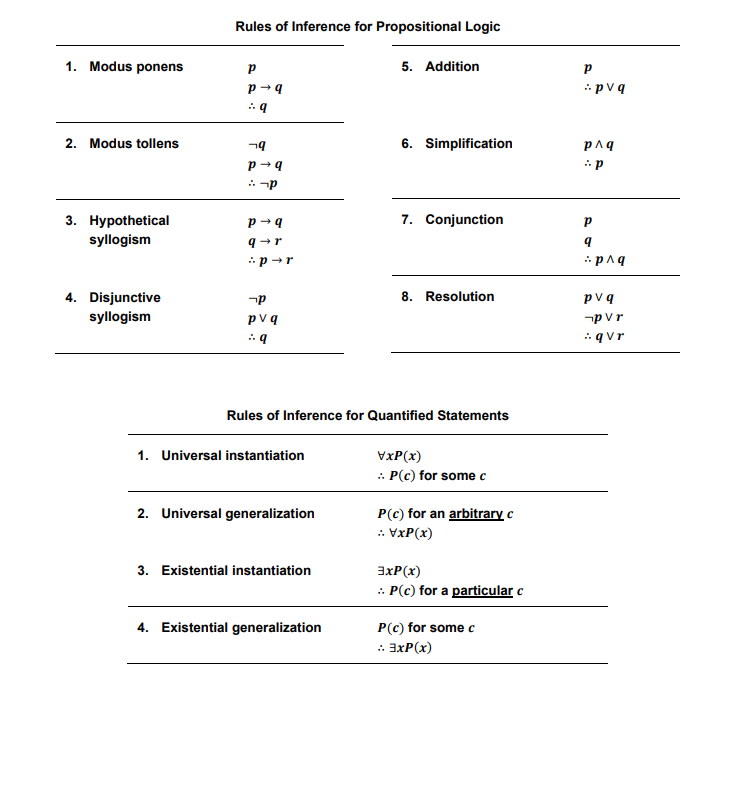Part I: Proving that an argument is valid using rules of inference 1. Write each of the following arguments in argument form. Then, use the rules of inference to show that each argument is valid. a. Let p be "it snows," q be "I take the subway," and r be "I am late for class." I take the subway when it snows. If I take the subway, then I am late for class. I was not late for class. Therefore, it did not snow. b. Let P(x) be "x attended the lecture," Q(x) be "x submitted the homework assignment," and R(x) be "x passed the exam," where the domain consists of all students in this class. Every student in this class who did not attend the lecture or did not submit the homework assignment did not pass the exam. Bob, who is a student in this class, passed the exam. Therefore, Bob attended the lecture. c. Let P(x) be "x attended the lecture," Q(x) be "x submitted the homework assignment," and R(x) be "x passed the exam,." where the domain consists of all students in this class.
Part I: Proving that an argument is valid using rules of inference 1. Write each of the following arguments in argument form. Then, use the rules of inference to show that each argument is valid. a. Let p be "it snows," q be "I take the subway," and r be "I am late for class." I take the subway when it snows. If I take the subway, then I am late for class. I was not late for class. Therefore, it did not snow. b. Let P(x) be "x attended the lecture," Q(x) be "x submitted the homework assignment," and R(x) be "x passed the exam," where the domain consists of all students in this class. Every student in this class who did not attend the lecture or did not submit the homework assignment did not pass the exam. Bob, who is a student in this class, passed the exam. Therefore, Bob attended the lecture. c. Let P(x) be "x attended the lecture," Q(x) be "x submitted the homework assignment," and R(x) be "x passed the exam,." where the domain consists of all students in this class.
Advanced Engineering Mathematics
10th Edition
ISBN:9780470458365
Author:Erwin Kreyszig
Publisher:Erwin Kreyszig
Chapter2: Second-order Linear Odes
Section: Chapter Questions
Problem 1RQ
Related questions
Question

Transcribed Image Text:Part I: Proving that an argument is valid using rules of inference
1.
Write each of the following arguments in argument form. Then, use the
rules of inference to show that each argument is valid.
a. Let p be "it snows," q be "I take the subway," and r be "I am late for class."
I take the subway when it snows. If l take the subway, then I am late for class. I was not
late for class. Therefore, it did not snow.
b. Let P(x) be "x attended the lecture," Q(x) be "x submitted the homework assignment," and
R(x) be "x passed the exam," where the domain consists of all students in this class.
Every student in this class who did not attend the lecture or did not submit the
homework assignment did not pass the exam. Bob, who is a student in this class,
passed the exam. Therefore, Bob attended the lecture.
c. Let P(x) be "x attended the lecture," Q(x) be "x submitted the homework assignment," and
R(x) be "x passed the exam," where the domain consists of all students in this class.
Every student in this class has attended the lecture or submitted the homework
assignment. Every student in this class who submitted the homework assignment but
did not attend the lecture did not pass the exam. Therefore, every student in this class
who passed the exam attended the lecture.

Transcribed Image Text:Rules of Inference for Propositional Logic
1. Modus ponens
5. Addition
:pvq
2. Modus tollens
6. Simplification
: -p
7. Conjunction
3. Hypothetical
syllogism
4. Disjunctive
syllogism
8. Resolution
pvq
pvq
-pvr
: qvr
Rules of Inference for Quantified Statements
1. Universal instantiation
VxP(x)
: P(c) for some c
2. Universal generalization
P(c) for an arbitrary c
: VxP(x)
3. Existential instantiation
3xP(x)
: P(c) for a particular c
4. Existential generalization
P(c) for some c
: 3xP(x)
Expert Solution
This question has been solved!
Explore an expertly crafted, step-by-step solution for a thorough understanding of key concepts.
This is a popular solution!
Trending now
This is a popular solution!
Step by step
Solved in 4 steps

Recommended textbooks for you

Advanced Engineering Mathematics
Advanced Math
ISBN:
9780470458365
Author:
Erwin Kreyszig
Publisher:
Wiley, John & Sons, Incorporated

Numerical Methods for Engineers
Advanced Math
ISBN:
9780073397924
Author:
Steven C. Chapra Dr., Raymond P. Canale
Publisher:
McGraw-Hill Education

Introductory Mathematics for Engineering Applicat…
Advanced Math
ISBN:
9781118141809
Author:
Nathan Klingbeil
Publisher:
WILEY

Advanced Engineering Mathematics
Advanced Math
ISBN:
9780470458365
Author:
Erwin Kreyszig
Publisher:
Wiley, John & Sons, Incorporated

Numerical Methods for Engineers
Advanced Math
ISBN:
9780073397924
Author:
Steven C. Chapra Dr., Raymond P. Canale
Publisher:
McGraw-Hill Education

Introductory Mathematics for Engineering Applicat…
Advanced Math
ISBN:
9781118141809
Author:
Nathan Klingbeil
Publisher:
WILEY

Mathematics For Machine Technology
Advanced Math
ISBN:
9781337798310
Author:
Peterson, John.
Publisher:
Cengage Learning,

